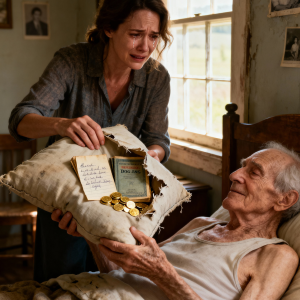
The walk from the taxi to the front steps felt like climbing a mountain. Chemotherapy had drained every ounce of strength from me, and the hospital band still circled my wrist like a cruel reminder. That morning, my husband, Marcus, had kissed my forehead and promised, “Don’t worry, Elise. Just get better. I’ll handle everything.” After seven years together, I believed him. That trust shattered the moment I opened the door.
The lock gave way too easily, and soft jazz floated through the house. For a heartbeat, I thought he’d planned a surprise for my return. But when I stepped into the living room, the illusion crumbled. Marcus sat on the couch, his lips locked with a woman I didn’t know. They clung to each other with the eagerness of new lovers, not a trace of guilt on his face when he finally noticed me.
“Elise,” he said flatly, as though I’d arrived too early to a dinner reservation. “Didn’t think you’d be back so soon.”
I stared, my voice breaking. “What is this?”

He stood, buttoning his shirt without rushing. “Let’s not drag this out. You’ve got one hour to pack your things and go. I’m finished playing caretaker to a sick wife.” His words cut sharper than any scalpel.
The woman—she looked no older than thirty, elegant in a silk blouse—laughed softly. “Maybe it’s for the best. Some people don’t know when to step aside.”
My knees threatened to give way, but anger burned hotter than the tears in my eyes. He wasn’t just betraying me; he was dismissing me like I was disposable.
An hour later, my suitcase sat by the door. Marcus leaned in the frame, smirking. “The house is mine. The savings are mine. You’ll leave with nothing, Elise.”
I lifted my chin, despite the weight of betrayal pressing down. “We’ll see, Marcus.”
The hotel I found that night was modest but quiet. While the pain of his words echoed in my chest, another thought pushed forward: the cameras. Years earlier, after a rash of burglaries, I’d hidden security cameras around the house. Marcus had never paid enough attention to notice. I opened the laptop and began scrolling through hours of footage. What I discovered tightened every muscle in my body.
On screen, Marcus and his mistress paraded through my kitchen, my bedroom, laughing. But it wasn’t just the affair—it was their words.
“She’ll be gone soon enough,” Marcus said, pouring wine from a bottle I’d saved for our anniversary. “The prenup won’t matter when she’s dead. I’ll be free, and everyone will pity the grieving husband.”
The woman giggled. “And you’ll inherit everything. Easy money.”
My hands trembled, not from weakness, but fury. He thought he’d already buried me. He thought I was powerless.
That night, I clipped a short segment of the video—just enough to show his cruelty—and posted it online. I tagged my attorney, someone I trusted since my parents’ estate settlement years ago. By morning, the video had spread like wildfire.
Calls poured in. My sister sobbed over the phone, friends sent messages of support, and my lawyer’s voice was calm but firm when she said, “Elise, your prenup is ironclad. Infidelity during illness strips him of all claims. The house, the accounts—they’re yours. He gets nothing.”
By noon, Marcus was blowing up my phone. “What did you do? Take it down!” I ignored him. By evening, he appeared at the hotel lobby, alone and frantic. To my surprise, he collapsed onto his knees in front of everyone.
“Elise, please. I’m sorry. I’ll take care of you. Just delete that post, come home. We can fix this.”
Dozens of eyes turned toward us. Phones recorded. I looked down at the man who had once vowed to stand beside me in sickness and in health, the same man who had calculated my death like a business transaction.
“You had a wife who would have walked through fire for you,” I said, my voice steady. “But you threw her into the flames. Now live with the ashes.” And I walked away, leaving him kneeling on the cold marble floor, surrounded by strangers’ stares.
The divorce was swift. The cameras provided undeniable proof, and the prenup sealed his fate. Within weeks, I was back in my own home—the same one he’d claimed as his future kingdom. Marcus, meanwhile, was forced to rent a dingy studio and sell used cars for commission. His reputation crumbled, his mistress vanished the moment the money dried up.

Six months later, my oncologist pronounced me in remission. My hair was sprouting again, and my energy returned. I’d fought cancer and betrayal in the same year—and won both battles. Sometimes I drove past his rundown apartment complex, not out of longing, but as a reminder of what I had survived.
One evening, he sent me a text: I made a mistake. Can we talk? I deleted it without hesitation.
Because here’s the truth: you can’t rebuild a man who discards his wife when she’s ill. You can’t forgive your way out of betrayal. But you can choose yourself, reclaim your dignity, and live a life free of those who mistake your love for weakness.
Marcus had wanted freedom. I gave it to him—permanently. As for me, I found a truer kind of freedom: one rooted in strength, self-respect, and the knowledge that karma doesn’t need interference. It only needs time. And time, ironically, was the one gift Marcus never thought I’d have enough of.



